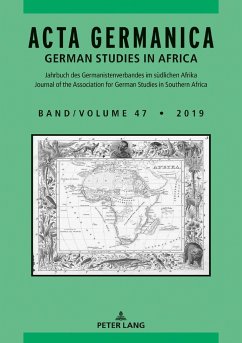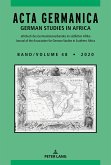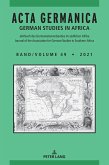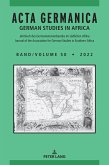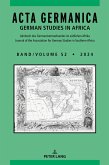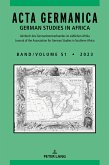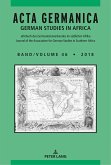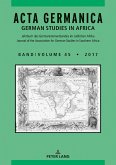Die ersten beiden Beiträge befassen sich mit der Vermittlung von Deutsch als Fremdsprache im südafrikanischen Kontext. Zwei Beiträge haben kollektives Gedächtnis und/oder Gedenken im Fokus: Der erste bezieht sich auf Gedächtnisregimes in Deutschland und der zweite auf die österreichische Erinnerungskultur. Die Flüchtlingskrise in Europa wird einerseits unter besonderer Berücksichtigung der europäischen Perspektiven auf afrikanische Flüchtlinge und andererseits unter Hinweis auf Beteiligung literarischer Texte am öffentlichen Diskurs über diese Krise untersucht. Die thematischen Zusammenhänge zwischen den Werken von Bettina von Arnim und Sophie Mereau zu Politik und Menschenrechten, deuten auf die historische Rolle, die Soziopolitik immer gespielt hat. Zwei Beiträge konzentrieren sich auf die Medien Film und Musik: F.W. Murnaus Nosferatu und zwei Lieder von M.-U. Kling und AnniKa von Trier werden diesbezüglich analysiert. Die abschließenden drei Artikel haben klassische literarische Texte im Fokus: Die Kapuzinergruft von Joseph Roth, W. G. Sebalds Die Ringe des Saturn und Die Verwandlung von Franz Kafka.
The first two contributions in this book focus on the teaching of German as a foreign language in the South African context. Two contributions engage with collective memory and/or commemoration: the first considering memory regimes in Germany and the second focusing on Austrian memory culture. The refugee crisis in Europe is evaluated with specific reference to European perspectives on African refugees and by looking at different ways in which literary texts participate in the public discourse on this crisis. An investigation into the thematic connections between the work of Bettina von Arnim and Sophie Mereau on politics and human rights indicates the historical role socio-politics has always played. Two contributions focus on the media of film and music: F.W. Murnau's Nosferatu and two songs by M.-U. Kling and AnniKa von Trier are analysed from this perspective. The concluding articles have classic literary texts as its focus: Joseph Roth's Die Kapuzinergruft, W.G. Sebald's Die Ringe des Saturn and Franz Kafka's Die Verwandlung.
The first two contributions in this book focus on the teaching of German as a foreign language in the South African context. Two contributions engage with collective memory and/or commemoration: the first considering memory regimes in Germany and the second focusing on Austrian memory culture. The refugee crisis in Europe is evaluated with specific reference to European perspectives on African refugees and by looking at different ways in which literary texts participate in the public discourse on this crisis. An investigation into the thematic connections between the work of Bettina von Arnim and Sophie Mereau on politics and human rights indicates the historical role socio-politics has always played. Two contributions focus on the media of film and music: F.W. Murnau's Nosferatu and two songs by M.-U. Kling and AnniKa von Trier are analysed from this perspective. The concluding articles have classic literary texts as its focus: Joseph Roth's Die Kapuzinergruft, W.G. Sebald's Die Ringe des Saturn and Franz Kafka's Die Verwandlung.

